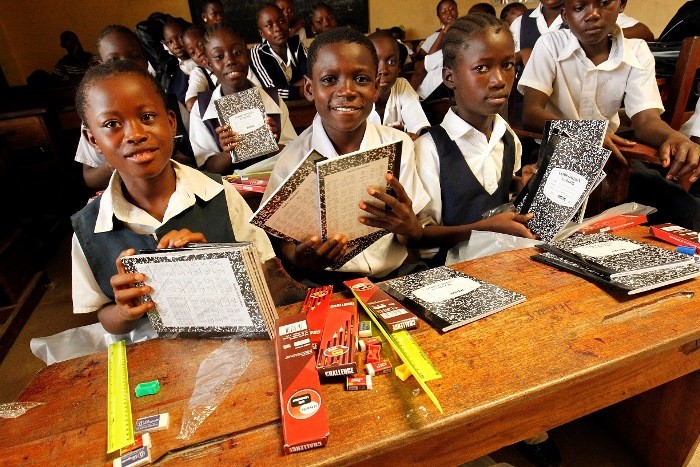
The Liberian education system is emerging from a prolonged and brutally destructive period of civil unrest. Long standing impacts from the war, compounded by the recent school closure due to the Ebola Viral Disease outbreak continue to take a toll on the fragile education system. The country is significantly behind most other African countries in nearly all education statistics. After 14 years of civil war, which resulted in the destruction of much of the country’s trained workforce, Liberia is still in the process of rebuilding its educational system. USAID, in concert with other donors, works with the Ministry of Education to address education challenges related to access, quality of instruction, and human and financial resources.
Our education programs focus on improving the quality of teaching and learning (especially in early grade reading and math), and increasing equitable access to safe learning opportunities for girls and for youth who missed out on education due to postwar reconstruction and a weak education system. We are helping to rebuild the curricula, teaching and management staff, instructional and learning resources, data systems and policy environment essential to providing basic education services to all Liberians.
We also assists ongoing Ministry of Education efforts to regularize the public school payroll and combat corruption through the installation of a national teacher biometric identification card system that will link the payroll and education management information system. The program supports government efforts to implement pre-service primary level certification teacher training programs; strengthen the Rural Teacher Training Institutes; and through school-based teacher training, implement the national plan to ensure all children are reading by the end of Grade 3.
YOUTH
The USAID Advancing Youth Project works to enhance the capacity of the Ministry of Education and non-governmental organizations to provide increased access to alternative basic education, social opportunities, leadership development, and sustainable livelihood pathways for out-of-school Liberian youth. The support ensures the Ministry and NGOs are able to provide youth, who have had little or no previous schooling, with the educational and work-readiness skills and training necessary to succeed.
HIGHER EDUCATION
Through the Excellence in Higher Education for Liberian Development project, we partner with the University of Liberia and Cuttington University to build Centers of Excellence to expand access, improve quality, and enhance the relevance of higher education programs in engineering and agriculture, fields that are critical to addressing Liberia’s development challenges.
USAID’s Center for Excellence in Health and Life Sciences project (part of the Africa-U.S. Higher Education Initiative partnership between the University of Liberia and Indiana University) focuses on increasing the University of Liberia’s teaching and learning resources for medicine, nursing, midwifery, life sciences, and public health. The project created a new two-year, Core Health and Life Science undergraduate program and helped improve the quality of instruction through faculty and staff strengthening, curriculum development, and upgrades in instructional resources.
GIRLS EDUCATION
Through the Girls’ Opportunities to Access Learning (GOAL) Plus program, USAID worked to build on earlier successes which saw an increase in girls’ access to education. GOAL Plus used a combination of scholarship packages for girls in grades 1-6 and parent-teacher association capacity building grants (with supplemental tutoring, girls’ clubs, and gender-sensitive pedagogy training components) to increase primary school girls’ enrollment, attendance, completion and promotion. The program supported girls in 60 schools located in Grand Bassa, Bong and Lofa counties. GOAL Plus also supported the MOE’s Girls’ Education Division in implementing the revised National Policy on Girls’ Education.
EBOLA RESPONSE
As a result of the Ebola outbreak, more than 4,400 Liberian schools were closed for six months, leaving 1.5 million children without access to formal education until schools were deemed safe to reopen. To alleviate the impact on the students, we supported continuous learning programs that promoted basic literacy and numeracy using interactive audio instruction or learning by radio for out-of-school youth. These programs included age appropriate health and life skills messages.
We also provided logistical support for the Ministry's national campaign to train school personnel in Ebola prevention and awareness, as well as provided technical assistance to further develop, monitor and implement its Ebola response plan.
With the re-opening of schools in February 2015, USAID is supporting the MOE in restoring basic education in the country and returning children to safe learning environments through the Education Crisis Response program.
EDUCATION POLICY IMPLEMENTATION
To support the Ministry's efforts to decentralize operations, USAID, through its Liberia Teacher Training Program II, provided assistance in preparing administrative regulations and policy guidelines, developing a new management structure, establishing a monitoring and evaluation framework and installing a comprehensive education management information system to ensure timely data for decision making. USAID also assists ongoing Ministry efforts to regularize the payroll and combat corruption through the installation of a national teacher biometric identification card system that will link the payroll and education management information system.
EARLY GRADE READING
In addition to the work of teacher training program, USAID’s Education Quality and Access in Liberia project provides a comprehensive teacher training program to improve learners’ early grade literacy and numeracy skills.








Comment
Make a general inquiry or suggest an improvement.